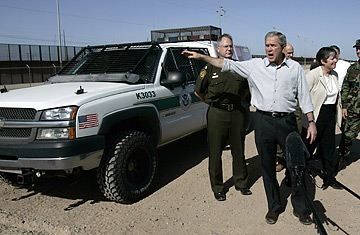
President Bush tours the border which separates Mexico from the U.S. in Yuma, Arizona, April 9, 2007.
Bush spent most of his time in Yuma talking about his achievements in combating illegal immigration: nearly doubling the number of border guards, funding hundreds of miles of border fence, a significant uptick in border arrests and so on. He also talked about progress in cracking down on illegal hiring of undocumented workers by restaurants, hotels, construction and food processing plants, among other employers. Burnishing his credentials as a law-and-order border guard is key to the effort.
But the President's "comprehensive" reform includes more than border security, and that's where conservative skepticism comes in. His proposals, unveiled to Democrats for the first time two weeks ago, aim to create not just tougher border security and tighter domestic enforcement at work sites, but also a new guest worker program and a solution for the 11-12 million illegal immigrants in the country. Though these goals are associated with a softer line on immigration, under his new plan, Bush has played to the hard-line consensus among Republicans on these issues too.
Although the plan does create a guest worker program, Democrats and Republicans familiar with it say it would not offer new guest workers a faster track to citizenship than it would to any other foreigner trying to become an American. And while the plan does offer a path to citizenship for the millions of illegal immigrants already in the country, it sets high hurdles: They would be sent to the end of the line of those applying for citizenship, would have to pay heavy fines for the years they have been in the country, would have to show that they have held a job while here, and would have to pay full back taxes on their earnings and pass an English exam. And in a major departure from U.S. immigration policy as it has existed since 1965, the plan would do away with citizenship for their family members.
Even as Bush struts and frets on the G.O.P. stage, Senator Edward Kennedy is doing the same for his audience, the pro-immigration left, which is calling for full amnesty for the illegal immigrants, a liberal guest worker program and broad new thresholds for immigration in coming years. Kennedy's staff says Bush will have to make concessions before Kennedy will sign up for the President's plan, and they insist the Massachusetts Senator won't back down on such core principles as reunification for immediate family members.
Yet, for all the appearance of conflict between the two men, each is well aware that he needs to the other to get an immigration reform bill passed — that's why they've been in deep discussions on the issue since the start this year. The positions each is taking now are less oriented toward coercing the other side than toward securing maximum support from within their own party. By giving the appearance of a deep Democrat-Republican divide, they increase the chances of winning their skeptics over to a compromise. Bush and Kennedy will have more leeway to make small concessions on fines or family reunification if each has the extremes of his own party on board.
It's a smart strategy, but it faces tough challenges, as both men are finding it harder to rally even centrist support than it was a year ago. Thanks to the 2008 elections, two key Republican backers of last year's effort at immigration reform, John McCain and Sam Brownback, have disappeared down the campaign trail. McCain had previously united with Kennedy to form a central Senate bloc for a compromise, while Brownback played a key role representing the compassionate right. Mel Martinez, a key Hispanic Republican voice in the debate, has also gone quiet since taking over the Republican National Committee.
For his part, Kennedy must deliver Democrats who in strictly political terms have no reason to back reform. The new Congress, under Democratic control, has had a very effective three-month run blocking Bush on everything from domestic proposals to foreign affairs and the war in Iraq. Handing the President a win on a major issue like immigration reform in the run-up to the 2008 elections might be good policy, but it would be bad politics.
At some point between now and the end of May, when Senate majority leader Harry Reid has said the Senate will vote on immigration reform, the theater will end and real negotiating will begin. But with thin centrist backing, skeptical party extremes, and very little time to negotiate, it will take more than compelling theater to get the deal done.
